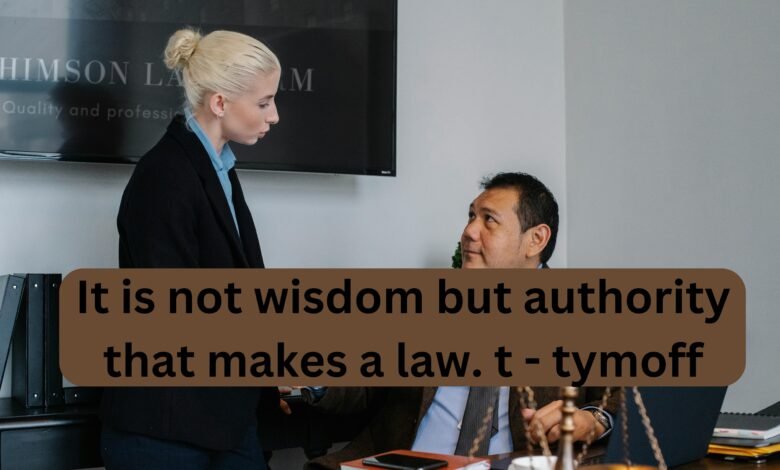It is not wisdom but authority that makes a law. t – tymoff : An In-Depth Analysis by BaddieHub

The assertion “It is not wisdom but authority that makes a law. t – tymoff ” raises critical questions about the nature of lawmaking and its foundations. This article, reviewed by the editorial team at BaddieHub, delves into the nuanced interplay between authority and wisdom in the creation of laws, examining historical perspectives, modern implications, and theoretical considerations. Our goal is to explore how these concepts influence legal systems and their effectiveness.
Understanding the Core Assertion
The phrase “It is not wisdom but authority that makes a law. t – tymoff ” suggests that the creation of laws is primarily driven by political authority rather than by intellectual or moral wisdom. This statement challenges the idealistic view that laws should be rooted in reason and justice.
Historical Perspectives on Authority and Wisdom
Plato’s Republic: The Philosopher-King Ideal
In The Republic, Plato proposed that the most just rulers would be philosopher-kings, individuals endowed with the highest wisdom. This ideal contrasts sharply with real-world scenarios where those in power often lack the philosophical or moral qualities envisioned by Plato. The philosopher-king concept highlights the tension between the ideal attributes of lawgivers and the practical realities of political authority.
Hobbes’s Leviathan : It is not wisdom but authority that makes a law. t – tymoff
Thomas Hobbes, in Leviathan, argued that the legitimacy of laws derives from the authority of a sovereign power. According to Hobbes, authority, rather than wisdom, is what enables the enforcement and stability of laws. This perspective underscores the foundational role of authority in the legal system, irrespective of the wisdom or ethical considerations of the laws themselves.
Authority vs. Wisdom in Modern Legal Systems
The Role of , It is not wisdom but authority that makes a law. t – tymoff
Legitimacy and Enforcement
“It is not wisdom but authority that makes a law. t – tymoff “provides the legitimacy necessary for laws to be enacted and enforced. Without a recognized authority, laws would lack the power to compel compliance. This authority is manifested in various forms, including legislative bodies, executive orders, and judicial decisions.
Drafting and Implementing Laws
Lawmakers use their authority to draft legislation, allocate resources, and oversee implementation. This authority is essential for maintaining order and ensuring that laws are applied consistently. However, reliance solely on authority can lead to laws that may not effectively address the needs of society.
The Importance of, It is not wisdom but authority that makes a law. t – tymoff
Ensuring Justice and Fairness
While “It is not wisdom but authority that makes a law. t – tymoff “is crucial for lawmaking, wisdom plays an equally important role in shaping just and effective laws. Wisdom involves considering the broader implications of laws, understanding societal needs, and incorporating ethical principles. Laws based solely on authority without wisdom can lead to unjust outcomes and public dissatisfaction.
Adaptability and Long-Term Impact
“It is not wisdom but authority that makes a law. t – tymoff “ensures that laws are adaptable to changing societal conditions and advancements in knowledge. Laws grounded in wisdom are more likely to be sustainable and effective over time. For example, reforms driven by empirical evidence and careful consideration of long-term consequences tend to achieve better outcomes than those based on mere authority.
The Dynamics of ,It is not wisdom but authority that makes a law. t –
tymoff
The Potential for Abuse
Risks of Concentrated Power
When authority is concentrated in the hands of a few, there is a risk of abuse and the creation of laws that serve narrow interests. This concentration of power can lead to authoritarianism, where laws are enacted without regard for fairness or justice. Mechanisms such as checks and balances are essential to prevent such abuses and ensure that authority is exercised responsibly.
Historical Examples of Abuse
Historical instances, such as the prohibition era in the United States or certain post-9/11 security measures, illustrate the consequences of relying excessively on authority. In these cases, laws were challenged due to their perceived injustice and lack of public support, leading to significant reform or repeal.
Balancing : It is not wisdom but authority that makes a law. t – tymoff
The Role of Public Support
For laws to be effective, they must garner public support and be perceived as legitimate. Laws based on wisdom, which consider diverse viewpoints and address real societal needs, are more likely to achieve this support. Authority alone does not guarantee compliance or legitimacy; it must be complemented by wisdom to ensure that laws are both fair and practical.
Examples of Wisdom-Led Reforms
Recent legal reforms demonstrate the benefits of integrating wisdom into the lawmaking process. Sentencing reforms aimed at reducing mass incarceration and marijuana legalization are examples of laws that were shaped by empirical evidence and social considerations. These reforms address past excesses of authority and reflect a more nuanced understanding of societal issues.
Theoretical Implications of, It is not wisdom but authority that makes a law. t – tymoff.
Legal Positivism vs. Natural Law
Legal Positivism
Legal positivists argue that the authority of laws derives from their enactment through proper procedures. According to this view, the validity of laws is based on their source rather than their content. Legal positivism emphasizes that laws created by legitimate authority must be obeyed, regardless of their wisdom.
Natural Law
In contrast, natural law theorists believe that laws should align with higher moral principles. According to natural law theory, authority alone is not sufficient; laws must also reflect fundamental ethical standards. This perspective constrains the authority of positive law with universal principles of justice and morality.
The Role of Realism and Critical Perspectives
Legal Realism
Legal realists focus on the practical impacts of laws rather than abstract concepts of ,It is not wisdom but authority that makes a law. t – tymoff . They emphasize that the effectiveness of laws depends on their real-world application and the social forces influencing their enforcement. Legal realism challenges the notion that authority alone can ensure justice and effectiveness.
Critical Legal Studies
Critical legal scholars examine how existing authority structures perpetuate inequalities and advocate for reforms that address marginalized perspectives. They argue that legal systems must evolve to better represent diverse viewpoints and rectify systemic injustices.
Conclusion
The assertion “It is not wisdom but authority that makes a law. t – tymoff “prompts a critical examination of the role of authority and wisdom in lawmaking. As reviewed by the editorial team at BaddieHub, this analysis underscores the importance of balancing authority with wisdom to create effective and just laws. Authority provides the legitimacy and enforcement necessary for laws to function, but wisdom ensures that these laws are fair, adaptable, and aligned with societal needs.
A nuanced understanding of these concepts helps in crafting legal systems that are not only authoritative but also wise, addressing the complexities of modern societies while remaining adaptable to future changes. Balancing authority and wisdom remains a central challenge in the pursuit of just and effective governance.
Also read: Azmovies : A Comprehensive Review by Baddiehub




